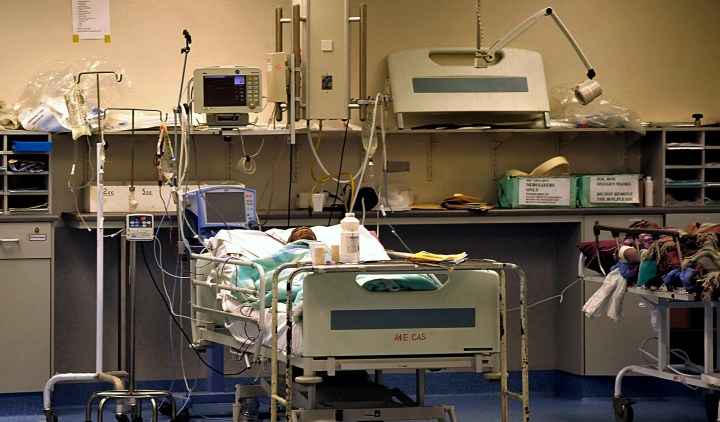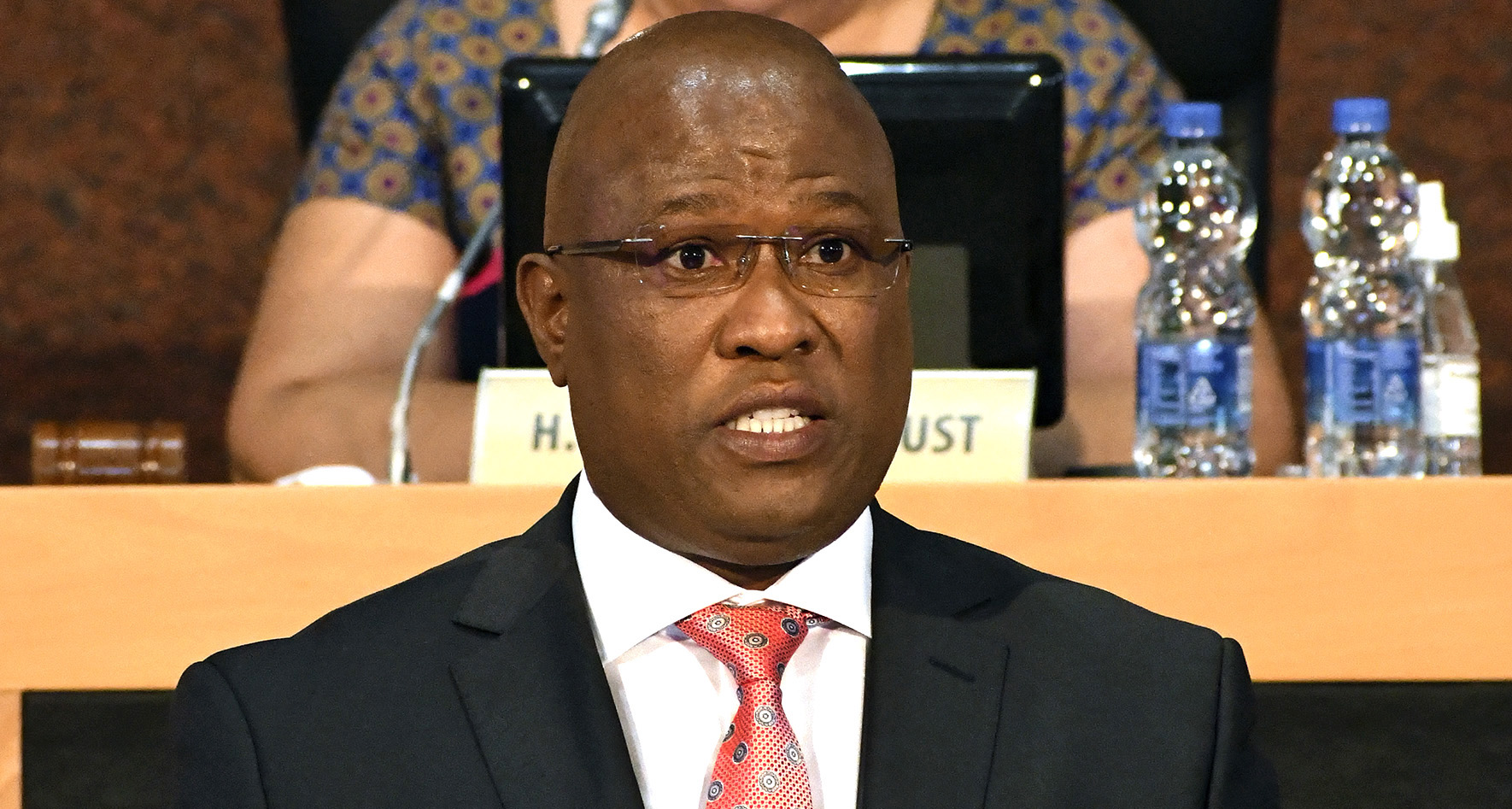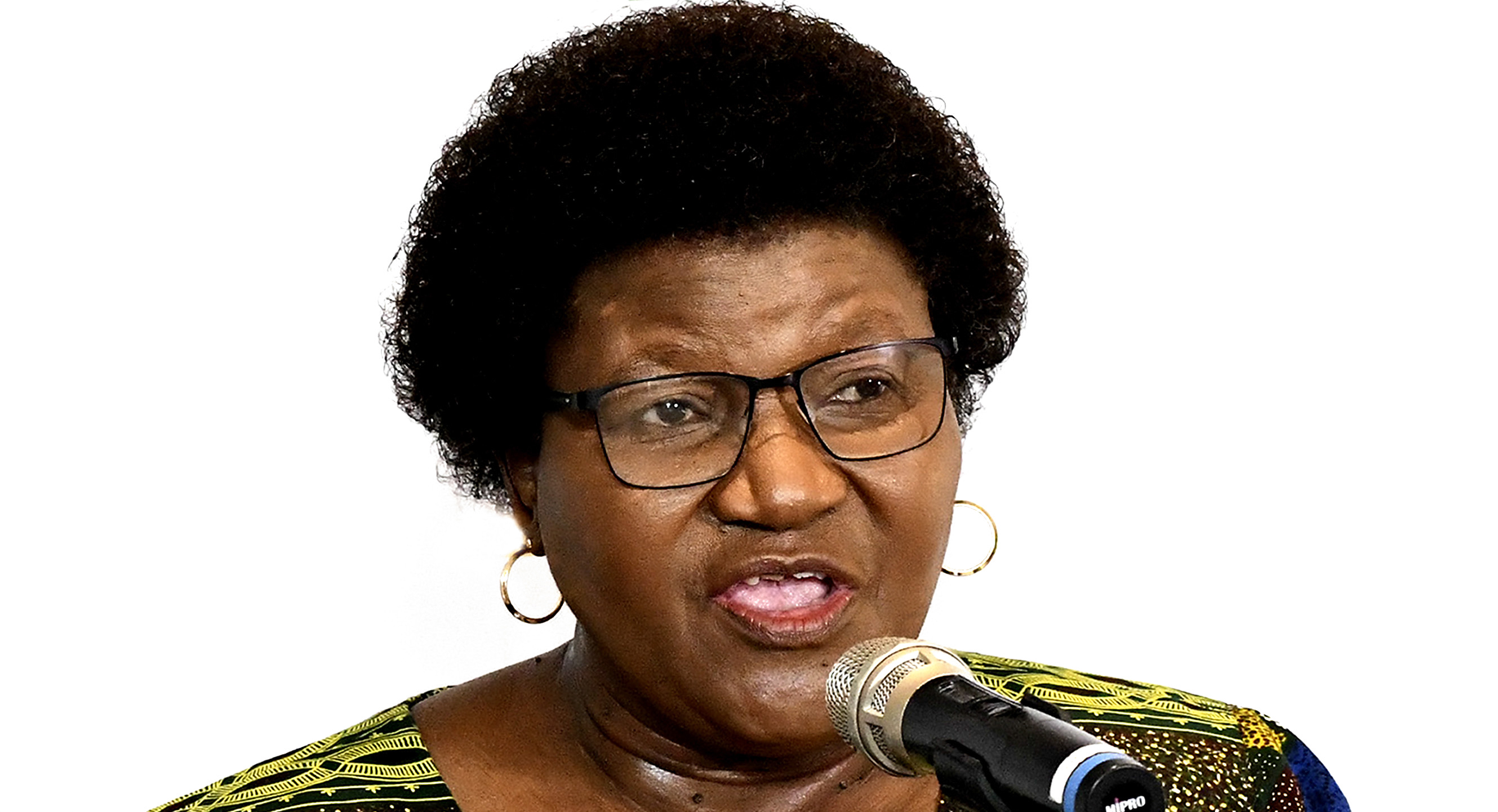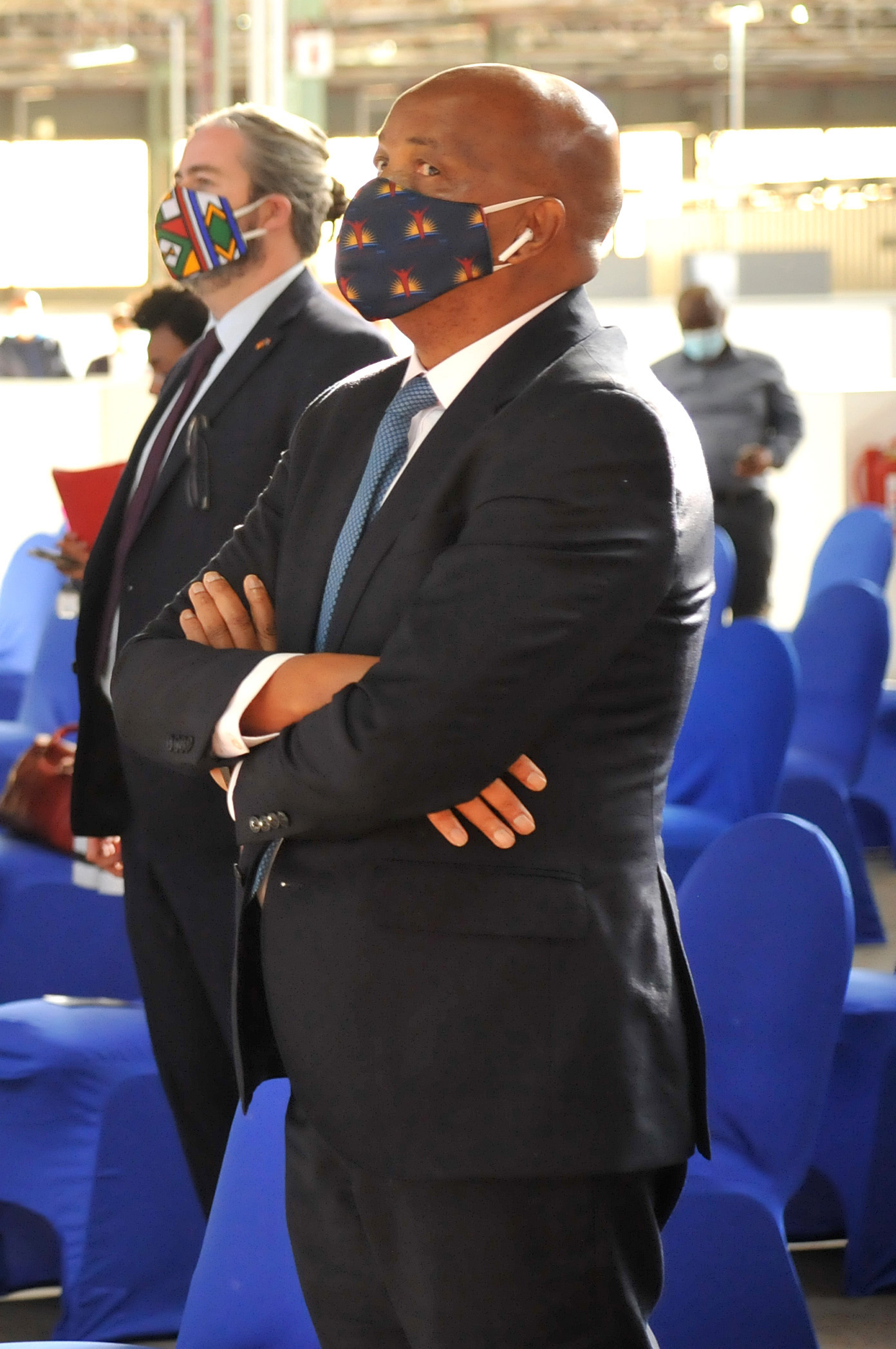DEATH AND DYING IN THE EASTERN CAPE: PART THREE
Province of disaster: Confessions, chaos and spin — responses to the shocking number of Covid-19 deaths

A classic case of too little care, too late — this is how one official summarised the findings of an audit into the high numbers of deaths that occurred in the Eastern Cape during the second wave of Covid-19 infections. Despite the sometimes angry insistence of Premier Oscar Mabuyane and his former MEC and close ally, Sindiswa Gomba, that there were enough beds, the audit shows that there weren’t.
After the devastating second wave of Covid-19 infections, the Eastern Cape Department of Health got a new superintendent-general, Dr Rolene Wagner, and a new MEC, Nomakhosazana Meth.
But before then, the province’s Covid-19 response was enmeshed in a fair amount of world-class spinning, obfuscation and refusals to make a report into public health facilities available.
As recently as last week, Premier Oscar Mabuyane’s spokesperson insisted that he had not seen the report, but that he would engage with the health department once he had read it.
“The premier has not seen the report, we are sending it to the department of health for an expert analysis of its contents which will then enable proper government response/action,” said Khuselwa Rantjie on behalf of Mabuyane.

Eastern Cape Premier Oscar Mabuyane. (Photo: Mandla Nduna)
She refused to answer questions on Mabuyane’s reasons for redeploying Dr Thobile Mbengashe, who, in mid-second wave, resigned from his post as superintendent-general of the Eastern Cape Department of Health — the person in charge of the province’s Covid response — and was appointed as a consultant on the provincial payroll.
After the first wave of infections exposed the deep flaws in the Eastern Cape’s preparations for the pandemic, a report by the national health department’s Dr Sibongile Zungu into the state of the province’s health facilities was buried by Mabuyane’s office — with his spin doctor saying there was no need to release it as they had made a summary.
This second audit into deaths — after a preliminary one conducted by the provincial department of health was similarly never made public — had officials saying only that many of the deaths were caused by patients who came to the hospitals too late.
Thoko Mtsholongo from the Eastern Cape Health Crisis Action Coalition, a group of organisations advocating for improved healthcare services in the province, said the pandemic had exacerbated existing challenges faced by the Eastern Cape Department of Health.
“This has been evidenced in the experiences of both the providers of health services at the point of care, as well those at the receiving end of those services. It goes without saying that the quality of services provided has not been optimal. As these challenges remain unresolved, even in the absence of a public health scare, quality health provision remains in doubt.”
An official familiar with the review said it was important not to find one particular aspect to “blame”. The official requested to remain anonymous.
“There were many similarities between the provinces. The most glaring finding was the late presentation of patients. There is a whole debate around the definition of late presentation, but it was obvious that people did not access the correct level of care timeously. This could be seen in people sometimes staying at home (going to pharmacies or clinics for medicines), failure of clinics and GPs to recognise the seriousness of the disease, inability to check O2 [saturation] at primary healthcare level, patients being scared to go to a hospital and transport issues.
“At the hospital level, there was sometimes a delay in monitoring O2 sats [oxygen saturation] and a delay in oxygen escalation. The audit showed that on average, patients presented to hospital with oxygen sats lower than 80 — normal range is between 95 and 100.
“We found that healthcare workers didn’t take into account the work of breathing, but focused only on the O2 sats. After a few days of maintaining oxygen sats of over 92% on nasal prongs, you suddenly saw patients crashing and then they died.
“I think as the second wave progressed, facilities that were doing reviews began to get an idea of what to do differently. This really speaks to the need for regular audits and team discussions. We sometimes saw that junior members of staff were left to manage the Covid wards, with little senior input.
“We also saw that patients were not reviewed daily — especially those admitted over a weekend. This was often difficult because of staff shortages due to high numbers of healthcare workers who had Covid-19. There were also high levels of exhaustion and burnout among staff.
“Some facilities prescribed every vitamin imaginable — many antibiotics, many analgesics (pain medication), despite evidence that was emerging to say that this was not evidence-based. Giving out lots of medication takes time for nurses… patients have to remove their oxygen masks and this nursing time could have been more wisely used.
“There was limited use of high-flow devices in district hospitals in the second wave… we saw some being used towards the end of the second wave. We also saw that some facilities didn’t have easy access to non-rebreather masks,” said the official.
Prof Alex van den Heever, Chair of Social Security Systems Administration and Management Studies at Wits University, said the Eastern Cape public health system was very weak on a number of other proxy indicators.
“I have been reviewing the cerebral palsy cases and maternal deaths, all of which suggest a department that is far from capable.
“The proxy indicators also include financial management, which is very bad, with irregular expenditure levels suggestive of endemic corruption and mismanagement.

Eastern Cape MEC for Health Nomakhosazana Meth. (Photo: Hoseya Jubase)
“Most of the deaths occurred in general wards — which means critical care beds were unavailable. This is aside from the other info presented on the quality of care.
“The province was also unable to coordinate care with the private sector — which was also short of beds during the wave peaks. A difficulty with the Eastern Cape at present is that their budget is being cut due to the population movement to the Western Cape.
“Theoretically they should be experiencing lower patient demand. But the reality is the administration is so weak that they cannot cope with complex transitions.
“The presentation concludes with approaches to deal with the clinical care failures. The problem is, however, very deep in the Eastern Cape. Leadership is lacking at many levels, making it difficult to implement logical measures to achieve service improvement.
“This is not the only province in this condition — but it is of concern due to the population size of the province,” he said.
Van den Heever said an analysis of maternal mortality rates before the pandemic hit — coupled with the Office of Health Standards Compliance facility audits (weighted by bed numbers) up to 2018/19 — had already shown the Eastern Cape to be a disaster.
“The Office of Health Standards Compliance has a minimum standard of 80%. The Eastern Cape is around 58%.”
Dean of the faculty of health sciences at Wits University, Prof Shabir Madhi, said that with a Covid-19 attributable mortality rate of about 609 per 100,000 people, deaths in the province during the pandemic were way above those of the Western Cape at 378 per 100,000.
“The figures speak for themselves with regard to a dysfunctional healthcare system that cannot be rescued in the midst of a crisis. Unfortunately, KwaZulu-Natal and the Northern Cape were not much better off, with death rates way above the national average of 494 per 100,000,” Madhi said.
The provincial excess deaths, an important measure of how well the health system handled the pandemic, puts excess deaths in the Eastern Cape at 789 per 100,000 — significantly higher than any of the countries flagged as most affected by the pandemic.
At the height of the first wave of infections, the province was already in trouble.
In July 2020, as the abysmal state of the health department became apparent, Premier Mabuyane requested a support team of experts from then national health minister Dr Zweli Mkhize to help implement strategies and guidelines on how to effectively respond to the pandemic.
“In the report of the assessment they conducted from 29 June 2020 to 10 July 2020, the support team found that while the province’s metros had mobilised reasonable infrastructure to meet the surge, the scale-up required attention to service delivery requirements such as the adequate provision of oxygen, equipment, human resources, medicines… and that procurement delays were hampering the surge capacity commitments.

Former Eastern Cape health MEC Sindiswa Gomba. (Photo: Mandla Nduna / GCIS)
“They recommended that we address inadequate coordination between tertiary, regional and district hospitals through the revised command and control structure, problems at Dora Nginza (Hospital) in the Nelson Mandela Bay Metro, which was being overwhelmed by the patient demand, lack of infrastructure, equipment and human resources to meet the clinical care demand.
“The support team also found that labour relations was an overwhelming issue that required a dedicated action plan, that historic arrangements for drainage areas, resource allocation and referral routings were not addressing the significant surge in patient numbers, particularly in underserved, vulnerable populations.
“In their report, the support team said the Emergency Medical Services and patient transport services require intervention to ensure continued function that all oxygen separation plants are located in the Nelson Mandela Bay area, making distribution of oxygen to hospitals far from the Nelson Mandela Bay present a risk of lead times being too long for replenishment,” Mabuyane wrote at the time.
Mabuyane then appointed Dr Sibongile Zungu, a high-ranking official from the National Department of Health, to head the province’s Covid-19 response.
At the time, he said calls for the department — whose political head, Sindiswa Gomba, was a close political ally of Mabuyane — to be placed under administration were misplaced because “we continue supporting infected people to recover, improve provision of healthcare in many areas”.
Gomba was eventually dismissed from Mabuyane’s provincial administration amid enormous public pressure in the wake of her arrest for alleged involvement in the misappropriation of funds for Nelson Mandela’s funeral, as well as scathing findings by the Special Investigating Unit into the procurement of “ambulance scooters” for primary healthcare in the province.
When Gomba was finally dismissed, it was not for her misplaced insistence throughout the first two waves that everything was under control and that there were enough beds at all levels of care.
At the time, Mabuyane said he was confident that the team led by Zungu would “fundamentally transform the department to improve its efficiency and effectiveness in delivering services to our people as demanded by our Constitution”.
By the time of the December 2020/January 2021 wave, driven by a variant first identified in the Eastern Cape, the province’s health department was bankrupt.

The former superintendent-general of the Eastern Cape Department of Health Dr Thobile Mbengashe at the opening of the Volkswagen Field Hospital, a facility that was donated to the provincial department of health, but closed after the second wave due to persistent staff shortages. (Photo: Mike Holmes)
The former superintendent-general of the department, Mbengashe, resigned from his post and was promptly rehired by Mabuyane as a “consultant” in charge of the province’s Covid-19 response.
A few weeks earlier, Mbengashe had admitted that “nobody should run a hospital” in the manner in which the department was managing Livingstone Hospital at the time. The current acting CEO of the facility, Dr Mtandeki Xamalashe, also said in an interview that by the time he was assigned to the hospital at the end of 2020, the facility was close to collapse.
Last week, the standing committee on public finances in the province heard that the health department, given its enormous financial problems, might have no choice but to submit to administration — or Mabuyane should face the possibility that the collapse of the department, with that of the education department, would bring the province to its knees.
The leader of the Democratic Alliance in the Eastern Cape legislature, Nqaba Bhanga, said there had been harsh criticism aimed at Mabuyane for his failure to deal with Mbengashe, and that this was very worrying.
“We call on the premier to act against Mbengashe. There are still issues he must answer,” Bhanga said, adding that the provincial government was being run like an employment agency while there was no money for basics like food, security and linen in hospitals.
Part of the problem, said Retief Odendaal, the DA’s spokesperson for finance, were the “millionaire managers” in the provincial government who cost taxpayers R2-billion when hospital managers had to decide whether to pay for oxygen or electricity.
“The premier promised the rationalisation of the public service, but never acted on it,” he said.
The Health Department’s accounts are overdrawn by R979-million and are facing medico-legal claims of more than R40-billion.

Eastern Cape health superintendent-general Rolene Wagner. (Photo: Supplied)
Provincial health superintendent-general Wagner said many of the concerns addressed in the report have been or are being addressed.
“The department has developed a project plan to implement the recommendations of the assessment conducted in November 2021. [These] are very clear and have been adopted for implementation over the next few months.
“Vaccination remains the mainstay in our approach to reduce fatalities due to Covid-19 infection,” she said.
“It is correct to say that the greatest proportion of admissions were patients who were at risk and not vaccinated. At the same time, our staff were both affected and infected at various times through the surges — this placed tremendous strain on our stretched resources. We are grateful to our healthcare workers who were a bulwark against this global assault in public health.
“It would be fair to say that our healthcare workers did the best they could with what they had at their disposal to provide care to our patients.
“The report highlights opportunities where we can improve on that care, in line with our culture of continuously striving to be better and do better.
“The report is clear on the factors contributing to the case fatality of Covid-19 patients. There are health system factors, but some relate to the health-seeking behaviour of the patients. The patients with comorbidities were also at high risk and therefore needed to be managed in a health facility early.
“The reviews seek to understand the modifiable causes of mortality and implement appropriate interventions. The vaccination programme is being ramped up to reach as many of the high-risk populations as possible — people with comorbidities and those older than 50 years of age.”
Wagner said there are no plans to “reduce the number of non-medical personnel in the department, because workers from a cleaner to a specialist are essential in the delivery of quality healthcare services to the people of the Eastern Cape.
“The department is working to secure an adequate stock of essential and life-saving medicines. Negotiations are taking place with major suppliers to extend the credit for another two months with the promise to settle the accounts in the new financial year,” she said, insisting that she did not believe the department should be placed under administration.
“This is because the department’s financial woes are not as a result of financial misconduct or mismanagement, but as a result of lump sum payments in medico-legal claims settlements… We are hard at work trying to stop the haemorrhaging.
“It is a concern to record such high numbers of deaths due to Covid-19. The report talks about the known challenges that Covid-19 had brought to the health systems, but also the importance of a health-seeking behaviour by those who are at high risk of serious Covid-19,” said Health MEC Nomakhosazana Meth.
“We are implementing the recommendations of that report, and also believe that the vaccination programme will turn things around…
“We continue to encourage those at high risk of severe Covid-19 disease (with comorbidities and/or older than 50 years of age) to get vaccinated or get a booster as soon as possible,” she said. DM/MC
Read Part One here and Part Two here
"Information pertaining to Covid-19, vaccines, how to control the spread of the virus and potential treatments is ever-changing. Under the South African Disaster Management Act Regulation 11(5)(c) it is prohibited to publish information through any medium with the intention to deceive people on government measures to address COVID-19. We are therefore disabling the comment section on this article in order to protect both the commenting member and ourselves from potential liability. Should you have additional information that you think we should know, please email [email protected]"




